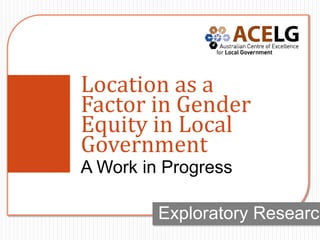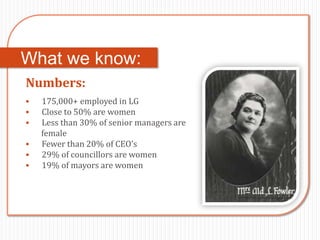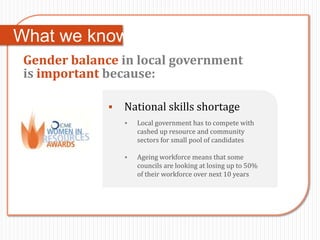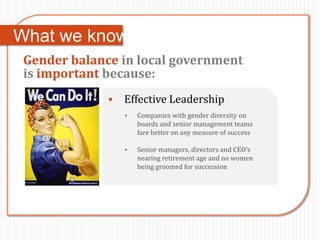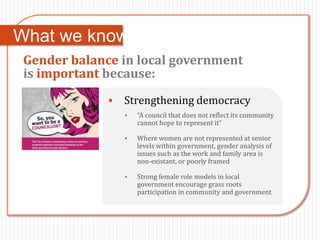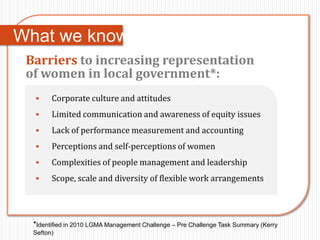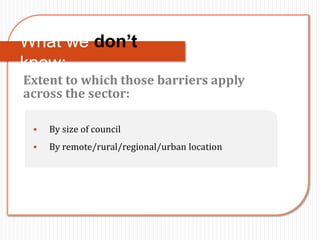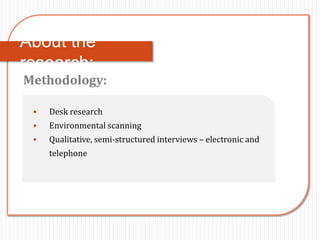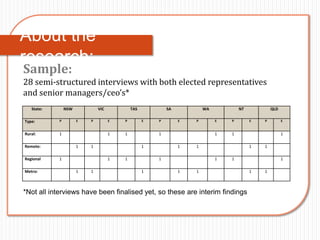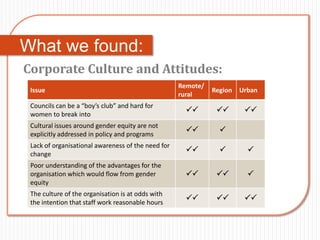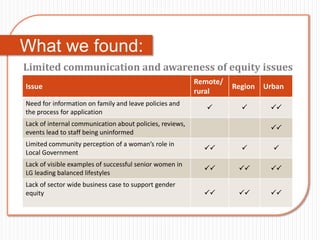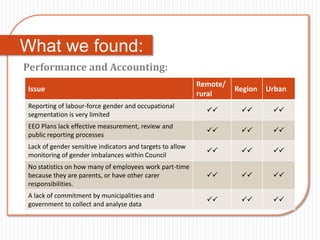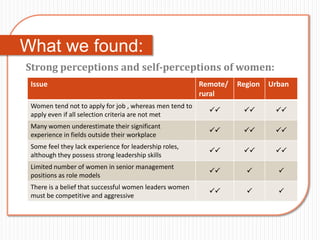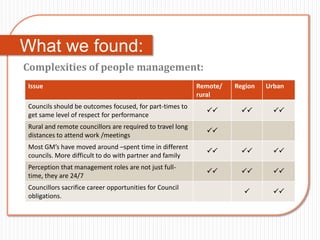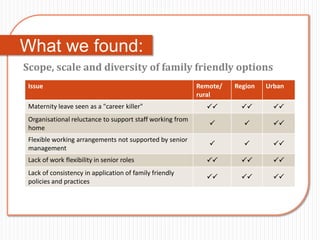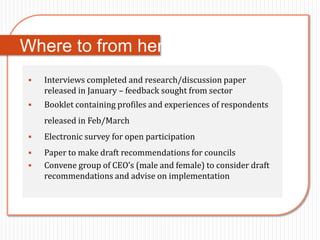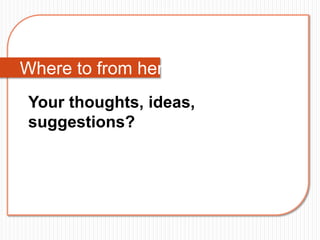Final gender equity councillors
- 1. Location as a Factor in Gender Equity in Local Government A Work in Progress Exploratory Research
- 2. What we know: Numbers: ´éº 175,000+ employed in LG ´éº Close to 50% are women ´éº Less than 30% of senior managers are female ´éº Fewer than 20% of CEOÔÇÖs ´éº 29% of councillors are women ´éº 19% of mayors are women
- 3. What we know: Gender balance in local government is important because: ´éº National skills shortage ´éº Local government has to compete with cashed up resource and community sectors for small pool of candidates ´éº Ageing workforce means that some councils are looking at losing up to 50% of their workforce over next 10 years
- 4. What we know: Gender balance in local government is important because: ´éº Effective Leadership ´éº Companies with gender diversity on boards and senior management teams fare better on any measure of success ´éº Senior managers, directors and CEOÔÇÖs nearing retirement age and no women being groomed for succession
- 5. What we know: Gender balance in local government is important because: ´éº Strengthening democracy ´éº ÔÇ£A council that does not reflect its community cannot hope to represent itÔÇØ ´éº Where women are not represented at senior levels within government, gender analysis of issues such as the work and family area is non-existant, or poorly framed ´éº Strong female role models in local government encourage grass roots participation in community and government
- 6. What we know: Barriers to increasing representation of women in local government*: ´éº Corporate culture and attitudes ´éº Limited communication and awareness of equity issues ´éº Lack of performance measurement and accounting ´éº Perceptions and self-perceptions of women ´éº Complexities of people management and leadership ´éº Scope, scale and diversity of flexible work arrangements *Identified in 2010 LGMA Management Challenge ÔÇô Pre Challenge Task Summary (Kerry Sefton)
- 7. What we donÔÇÖt know: Extent to which those barriers apply across the sector: ´éº By size of council ´éº By remote/rural/regional/urban location
- 8. About the research: Methodology: ´éº Desk research ´éº Environmental scanning ´éº Qualitative, semi-structured interviews ÔÇô electronic and telephone
- 9. About the research: Sample: 28 semi-structured interviews with both elected representatives and senior managers/ceoÔÇÖs* State: NSW VIC TAS SA WA NT QLD Type: P E P E P E P E P E P E P E Rural: 1 1 1 1 1 1 1 Remote: 1 1 1 1 1 1 1 Regional 1 1 1 1 1 1 1 Metro: 1 1 1 1 1 1 1 *Not all interviews have been finalised yet, so these are interim findings
- 10. What we found: Corporate Culture and Attitudes: Remote/ Issue Region Urban rural Councils can be a ÔÇ£boyÔÇÖs clubÔÇØ and hard for women to break into ´üÉ´üÉ ´üÉ´üÉ ´üÉ´üÉ Cultural issues around gender equity are not explicitly addressed in policy and programs ´üÉ´üÉ ´üÉ Lack of organisational awareness of the need for change ´üÉ´üÉ ´üÉ ´üÉ Poor understanding of the advantages for the organisation which would flow from gender ´üÉ´üÉ ´üÉ´üÉ ´üÉ equity The culture of the organisation is at odds with the intention that staff work reasonable hours ´üÉ´üÉ ´üÉ´üÉ ´üÉ´üÉ
- 11. What we found: Limited communication and awareness of equity issues Remote/ Issue Region Urban rural Need for information on family and leave policies and ´üÉ ´üÉ ´üÉ´üÉ the process for application Lack of internal communication about policies, reviews, ´üÉ´üÉ events lead to staff being uninformed Limited community perception of a womanÔÇÖs role in ´üÉ´üÉ ´üÉ ´üÉ Local Government Lack of visible examples of successful senior women in ´üÉ´üÉ ´üÉ´üÉ ´üÉ´üÉ LG leading balanced lifestyles Lack of sector wide business case to support gender equity ´üÉ´üÉ ´üÉ´üÉ ´üÉ´üÉ
- 12. What we found: Performance and Accounting: Remote/ Issue Region Urban rural Reporting of labour-force gender and occupational ´üÉ´üÉ ´üÉ´üÉ ´üÉ´üÉ segmentation is very limited EEO Plans lack effective measurement, review and ´üÉ´üÉ ´üÉ´üÉ ´üÉ´üÉ public reporting processes Lack of gender sensitive indicators and targets to allow ´üÉ´üÉ ´üÉ´üÉ ´üÉ´üÉ monitoring of gender imbalances within Council No statistics on how many of employees work part-time because they are parents, or have other carer ´üÉ´üÉ ´üÉ´üÉ ´üÉ´üÉ responsibilities. A lack of commitment by municipalities and ´üÉ´üÉ ´üÉ´üÉ ´üÉ´üÉ government to collect and analyse data
- 13. What we found: Strong perceptions and self-perceptions of women: Issue Remote/ Region Urban rural Women tend not to apply for job , whereas men tend to ´üÉ´üÉ ´üÉ´üÉ ´üÉ´üÉ apply even if all selection criteria are not met Many women underestimate their significant ´üÉ´üÉ ´üÉ´üÉ ´üÉ´üÉ experience in fields outside their workplace Some feel they lack experience for leadership roles, ´üÉ´üÉ ´üÉ´üÉ ´üÉ´üÉ although they possess strong leadership skills Limited number of women in senior management ´üÉ´üÉ ´üÉ ´üÉ positions as role models There is a belief that successful women leaders women ´üÉ´üÉ ´üÉ ´üÉ must be competitive and aggressive
- 14. What we found: Complexities of people management: Issue Remote/ Region Urban rural Councils should be outcomes focused, for part-times to ´üÉ´üÉ ´üÉ´üÉ ´üÉ´üÉ get same level of respect for performance Rural and remote councillors are required to travel long ´üÉ´üÉ distances to attend work /meetings Most GMÔÇÖs have moved around ÔÇôspent time in different ´üÉ´üÉ ´üÉ´üÉ ´üÉ´üÉ councils. More difficult to do with partner and family Perception that management roles are not just full- ´üÉ´üÉ ´üÉ´üÉ ´üÉ´üÉ time, they are 24/7 Councillors sacrifice career opportunities for Council ´üÉ ´üÉ´üÉ obligations.
- 15. What we found: Scope, scale and diversity of family friendly options Issue Remote/ Region Urban rural Maternity leave seen as a "career killer" ´üÉ´üÉ ´üÉ´üÉ ´üÉ´üÉ Organisational reluctance to support staff working from ´üÉ ´üÉ ´üÉ´üÉ home Flexible working arrangements not supported by senior ´üÉ ´üÉ ´üÉ´üÉ management Lack of work flexibility in senior roles ´üÉ´üÉ ´üÉ´üÉ ´üÉ´üÉ Lack of consistency in application of family friendly ´üÉ´üÉ ´üÉ´üÉ ´üÉ´üÉ policies and practices
- 16. Where to from here: ´éº Interviews completed and research/discussion paper released in January ÔÇô feedback sought from sector ´éº Booklet containing profiles and experiences of respondents released in Feb/March ´éº Electronic survey for open participation ´éº Paper to make draft recommendations for councils ´éº Convene group of CEOÔÇÖs (male and female) to consider draft recommendations and advise on implementation
- 17. Where to from here: Your thoughts, ideas, suggestions?

